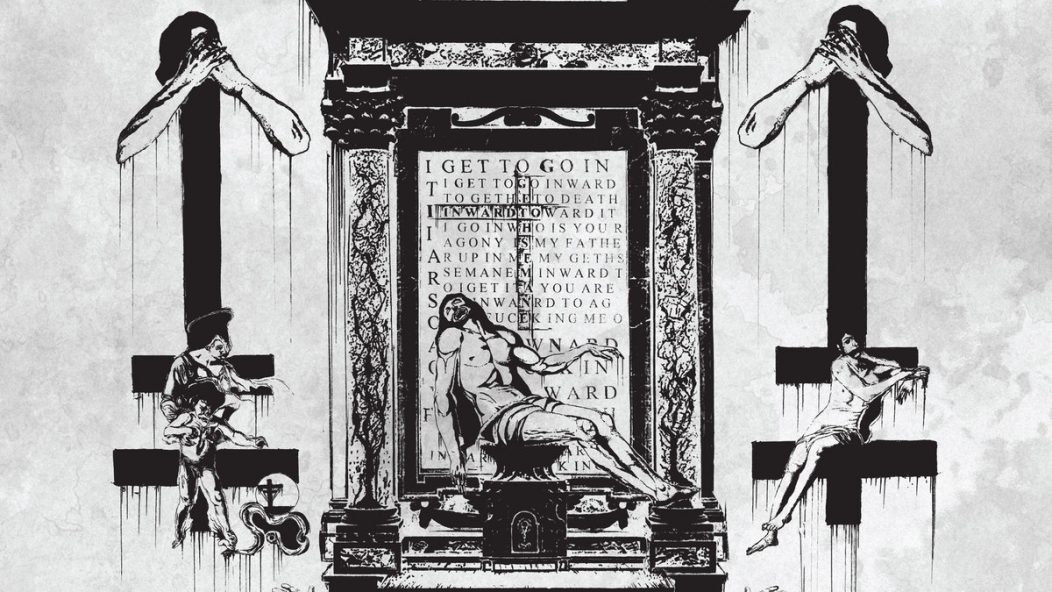
"Inward to Gethsemane" Marks Vastum's Deepest Descent Into Sacred and Profane Horror (Interview)
Vastum's bleakest death metal record to date arrives November 10. Inward to Gethsemane, an allusion to the garden where Jesus supposedly wept after realizing his fate, is blood-curdling—the album is an exploration of "the limits of purity," and its seven tracks ricochet between anguish and disgust.
"This album was an opportunity for us to take some of the religious or mystical themes to their limit," vocalist Dan Butler says. "I was thinking a lot about different forms of spiritual agony and modern life. One of them was just like being… abused throughout life, and then living a life of misery."
The band has always focused lyrically on the erotic and profane. However, Butler is clear that Vastum isn't gross for grossness's sake. In the case of Inward to Gethsemane, sexual anxiety and piety intertwine in a cocktail of guilt, shame, and decadence that works well over some of the band's most compelling riffs.
"On this latest album, I think there was an intentional desire to move away from this kind of reductive way that sometimes we're portrayed as a band preoccupied with sex," he says. One differentiator is this greater focus on religion, and Christianity in particular, which the band underscores with light touches of synth and haunting chanted vocals. The album also ties closely in with the writings of Georges Bataille, known for exploring the baseness of materialism and the darker corners of human desire.
"[Batailles] thought that mysticism in particular was closely related to eroticism," Butler notes, "but paradoxically, because the two are so incredibly opposed to each other."
…
…
Inward to Gethsemane wallows in this middle ground between the mystical and erotic, and nowhere is this clearer than on closer "Corpus Fractum." The song is one of the band's most gripping compositions in nearly 15 years of songcraft. It's also notable for featuring two samples at the beginning that firmly ground this track in horrific abuse. The band pulled one from an interview with a sadist, while the second draws on the unflinching interviews of YouTuber Mark Laita's channel Soft White Underbelly.
"For me, the second sample made me feel better about using the first sample," guitarist and vocalist Leila Abdul-Rauf says. The band went back and forth on whether and how to use existing recordings, but Butler says their ultimate decision helps channel the intent of "Corpus Fractum."
"[The song] is also about god sadistically abusing his only son to the point of crucifixion," Butler says. "The idea that extreme abuse breaks someone is biblical… I wanted the samples at the beginning to evoke the evil of Christ’s agony and crucifixion, not just the ‘secular’ idea of sadistic abuse or trauma."
Both Butler and Abdul-Rauf have professional experience in mental healthcare, but Vastum allows them ways to plumb the depths of the mind. Butler says Vastum is "sometimes at odds" with his therapeutic work but allows for a fuller review of "the darker side." The two vocalists' dueling approach has always worked, but Inward to Gethsemane sees Butler and Abdul-Rauf evenly exchanging horrors without the veil of reverb that characterized 2015's excellent Hole Below.
The record's lyrics are unflinching. "I’m still here, dead as a toy/Misandrous, no breath to sustain/I can either play dead or be dead/They won’t notice," Abdul-Rauf rasps on "Priapic Chasms." The record is full of such allusions to the horrors humans inflict on one another but, as on spoken-word track "Judas," also grounds said horrors firmly in theological tradition.
Butler has explored these themes further in the record's visual art, and using religion as an ingress point seems to have unlocked even lower levels of despair than the band have previously explored.
The album finds the band at a turning point in multiple ways. Abdul-Rauf, a talented multiinstrumentalist, and Gregory C. Hagan both contribute dark ambience to several tracks on the record. These subtle layers seem to presage shifts in sound. "I'd like to get a little more cinematic with it, but not stray too far," Abdul-Rauf says.
But personnel shifts also mean Vastum will look different moving forward. Guitarist Shelby Lermo (also of Ulthar, who released a double album earlier this year) departed the band after the completion of the record. Abdul-Rauf says the band wishes Lermo the best and has several candidates who may take on his role. In the meantime, she says, "I'm excited about getting this record onto the stage."
Inward to Gethsemane uses a death metal palette to paint a disturbing picture that will translate well to Vastum's pummeling live show in 2024 (Abdul-Rauf, incidentally, will be playing one more solo set at the Golden Bull as that venue's future remains uncertain). Though both band members have kept busy—Abdul-Rauf has done several features and is preparing her next solo release, and Butler continues to work with Acephalix while planning a turn with similarly morbid Decrepisy—both vocalists are looking forward to bringing these new works to the public.
"There's got to be a whole like audience out there who thinks you and I are fucking insane," Abdul-Rauf laughs.
Butler says, "it's like [our music] needs to be something that's unsettling." He reflects on the new album as the latest stop on a journey of darkness.
"What we've tried to do with the band is actually create something that is hard to endure in some way," Butler says, "even if it's also very gratifying aesthetically."
That certainly describes Inward to Gethsemane. The album is out November 10 via 20 Buck Spin.










